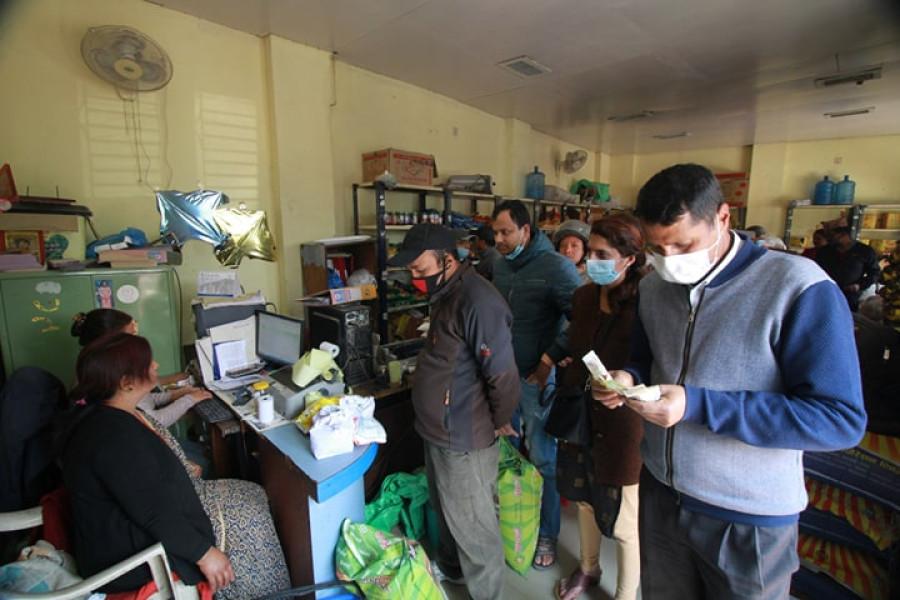National
With most shops closed in the lockdown, concerns rise about daily essentials
In an attempt to relieve confusion, the Ministry of Supplies has asked all shops selling food, vegetables, milk, water, oil, gas and the like to remain open.
Prithvi Man Shrestha
On the first day of the nationwide lockdown, Pabitra Bajracharya, proprietor of Right Mart, a retail shop, was unable to do business because he could not get to his shop in Swayambhu from his home at New Road’s Ombahal, as both private and public vehicles were prohibited from running.
“Many retailers are confused about whether they can open up shop so they didn’t open on Tuesday,” said Bajracharya, who is also the president of the Nepal Retailers' Association. “Many retail shops also could not open because their shops were far away from their residences.”
While announcing the lockdown on Monday, the government had said that shops supplying essential goods, like food and medicine, would be allowed to open, but on Tuesday, most shops in Kathmandu Valley remained closed.
The lockdown was announced to prevent an outbreak of Covid-19, after the second confirmed case in Nepal was identified on Monday—a 19-year woman who had recently returned from France.
With the lockdown supposed to last a week, until March 31, there are concerns among the public regarding the supply of daily essentials like water, milk, eggs, grains, vegetables and fruits. According to retailers, many have already stocked up, fearing a possible shortage.
Government officials, however, have been quick to assure the public that there will be no shortages of essential items in the market while making clear that there is no prohibition on selling food items and other essentials.
Kedar Nath Sharma, spokesperson for the Home Ministry, said that shops that sell food, vegetables, fuel, water and medicines are allowed to open. Many shopkeepers live close to their shops and those who don't can obtain permission from the Chief District Office, said Sharma.
“People can visit their shops that are within the walking distance,” he said. “But if anybody needs to travel by road, a special pass must be obtained from the District Administration Office.”
Sharma said there has been no obstruction in the transport of essential goods across the country and that supplies were incoming.
The Ministry of Industry, Commerce and Supply on Tuesday issued a public notice urging traders to open their shops if they are selling vegetables, fruits, milk, water, cooking gas and medicines.
“Those who open shops must wear masks and wash their hands with sanitiser or soap from time to time,” the notice stated. Transport workers too must wear masks and use sanitiser along the way.
Even large supermarkets like Bhatbhateni, Bigmart, Salesberry, and others, can open, according to the ministry's notice.
“But shops will have to ensure that customers remain at a distance of at least one metre from each other,” the notice reads.
The ministry has also decided to operate shops run by state entities like Salt Trading Corporation and the Food Management and Trading Company.
Kumar Rajbhandari, spokesperson for the Salt Trading Corporation, said that the Corporation has readied six outlets—in Satungal, Kalimati, Koteshwor, Dhapakhel, Banepa and Bhaktapur—to sell salt, sugar, rice, pulses, cooking oil, and cooking gas.
“If we are provided with security and travel arrangements for our staff, we can open these shops immediately,” said Rajbhandari.
The Ministry of Industry, Commerce and Supplies has also asked industrialists to continue operations related to medicine, health equipment, food items, drinking water, dairy and energy at full capacity while ensuring adequate safety measures for workers against Covid-19.
“Now that the government has cleared things up, most retail shops that sell food should be open on Wednesday,” said Bajracharya, the owner of Right Mart and president of Nepal Retailers' Association.
The Covid-19 pandemic has already killed more than 17,000 people while infecting more than 390,0000 people across the world since the coronavirus was first identified in Wuhan, China in late December. Nepal reported its second case of the coronavirus on Monday.




 18.12°C Kathmandu
18.12°C Kathmandu














